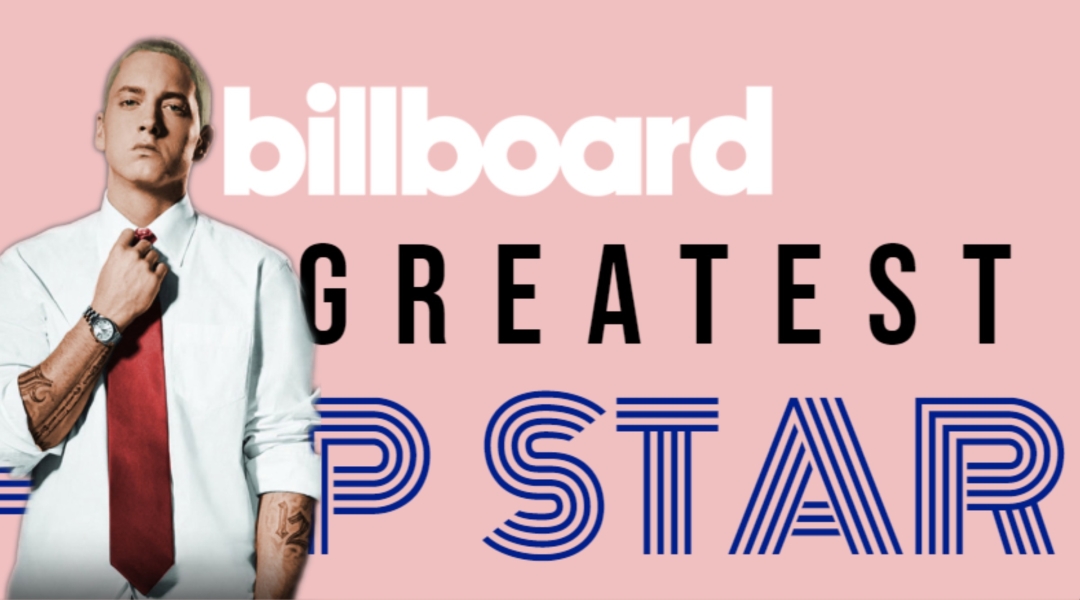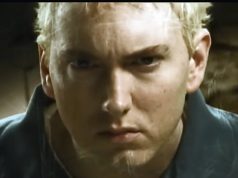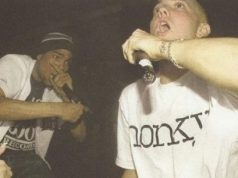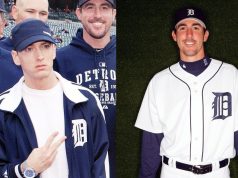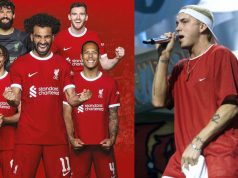The longest list of the biggest names in pop year by year from 1981 to 2019 is published by Billboard and Eminem has more than entry there.
Marshall has been chosen to symbolise 2002 with the entry written by Joe Lynch:
…While Eminem may seem like an unlikely pop hero, when you take into account the whiplash and confusion that characterized that year, perhaps only someone this angry could truly define 2002.
At this point, Eminem was perfectly poised to come across both as an authority and a provocateur – with two smash albums under his belt, he was a proven force in the industry and an instantly recognizable face nationwide. But just shy of 30 and only in the public eye for three years by 2002, he could still convincingly play the role of s–t-stirring outsider tackling the personal and the political with equal dexterity.
That’s exactly what Em did on The Eminem Show, a blockbuster set that went after a diverse roster of targets such as Dick Cheney, Moby and Chris Kirkpatrick – and that’s only on lead single “Without Me.” From addressing his own white privilege to including a “skit” from music biz insider Paul Rosenberg to interpolating Aerosmith, there’s a lot in The Eminem Show that you wouldn’t have expected to find on 2002’s best-selling album. And yet it topped the Billboard 200 for six non-consecutive weeks, became Eminem’s second consecutive Diamond-certified set, and produced four top 20 Hot 100 hits – the first two of which, “Without Me” and “Cleanin’ Out My Closet,” were utterly inescapable that year.
Despite Shady claiming “they try to shut me down on MTV” in its lyrics, the frenetic, superhero-centric clip for “Without Me” was in constant rotation on the channel that summer, with Em playing Robin to Dr. Dre’s Batman. Ever the button-pusher, he even dressed up as Osama Bin Laden in the clip – and it hadn’t been a year since Sept. 11. The clip would win four VMAs that August, including video of the year, and later also secured the Grammy for best music video. Follow-up “Cleanin’ On My Closet” was a deeply personal, deadly serious counterpart, an account of the rapper’s traumatic, impoverished childhood set to minimal 808s and strings. It’s such a harsh targeting of his mother that on 2017’s “Headlights,” he publicly apologized to her for it, and admitted he hates hearing it on the radio.
The Eminem Show alone would’ve made 2002 a career-defining year for Marshall Mathers, but he followed it up with something unheard of for an artist in his position: a starring role in a much-hyped movie. OK, film turns from pop stars – especially ones where they essentially play themselves – aren’t exactly shocking, but 8 Mile leap-frogged all expectations. A critical and commercial smash (with Eminem’s performance in particular drawing rave notices), the largely Em-produced soundtrack also topped the Billboard 200 for two weeks, while his own lead single “Lose Yourself” became arguably the defining song of his career.
Not only was the cinematic, Rocky-styled rap-rock underdog anthem Marshall’s first Hot 100 topper, but it stayed there for 12 weeks. “Lose Yourself” also brought Eminem to a new level of mainstream acclaim, winning an Oscar for best original song in early 2003 – the first hip-hop song to earn that award – around the same time The Eminem Show won best rap album at the Grammys, giving him a third win in the category in four years’ time. While Eminem was cultural shorthand for political and parental distaste in 2000, he was 2002’s biggest pop star, winning over detractors and seemingly only bolstered by those who continued to rail against him.
Em is also named “Rookie of the year” for 1999:
The biggest hit he had in 1999 was his debut single “My Name Is,” which just scraped the top 40, placing no higher than 36. Still, there is no question that Eminem dominated the areas of 1999 that weren’t defined by Britney Spears or BSB. Furious and funny – and thanks to producer Dr. Dre, quite funky – The Slim Shady LP courted controversy from all quarters. Eminem’s violent, provocative imagery provided a lightning rod in 1999 but underneath that bluster, he proved himself a dextrous, quick-witted rapper – and his angst appealed to adolescents who would’ve been listening to grunge earlier in the ’90s.
For the year 2000, you can find Eminem in the section “Honourable mention” where he is featured with “The Marshall Mathers LP”, “The Real Slim Shady” and Dr. Dre’s “Forgot About Dre”.
You can read the full list on Billboard.com


